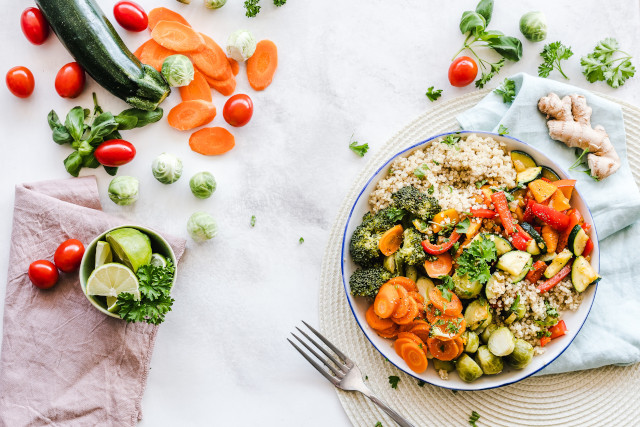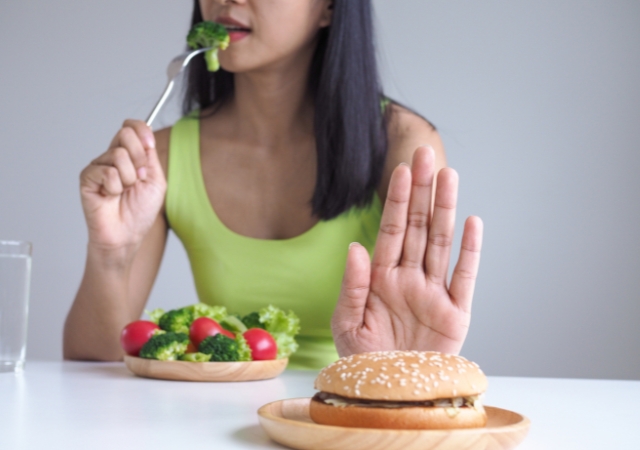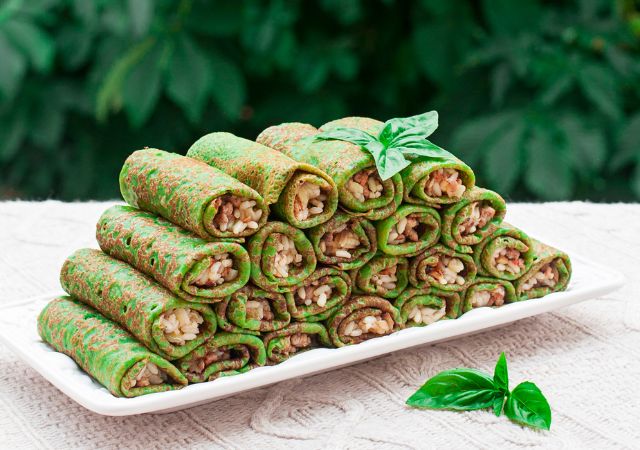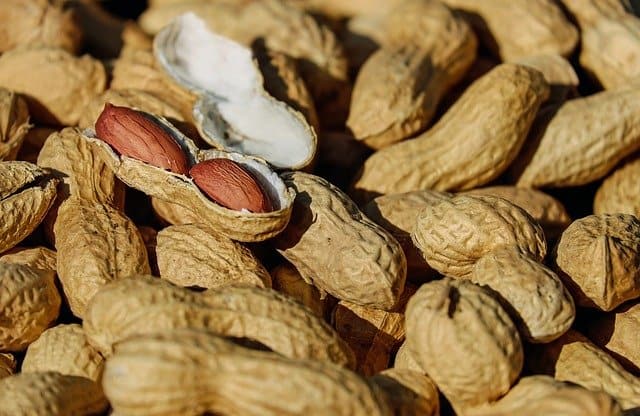
You may be familiar with the trends to trade your peanuts out for healthier options, such as almonds, cashews, pistachios, etc. You have also probably seen that peanuts have gotten a bad reputation if you have. So much so that people have actually forgotten the nutritional chemistry of the peanut to the value to our health.
Contents
The question many are asking, especially when it comes to peanuts, is this; are peanuts suitable for people with diabetes? The answer may shock you, as you might think of peanuts and immediately think of delicious desserts and things that might not necessarily be good for people with diabetes.
What do you think of when you think about peanut butter and apples, crushed peanuts in Pad Thai, and freshly roasted peanuts? Do you think of a healthy treat that can help regulate your blood sugar or potentially prevent type 2 diabetes? Some people might say no, but just read on before answering that question.
Check With Your Doctor
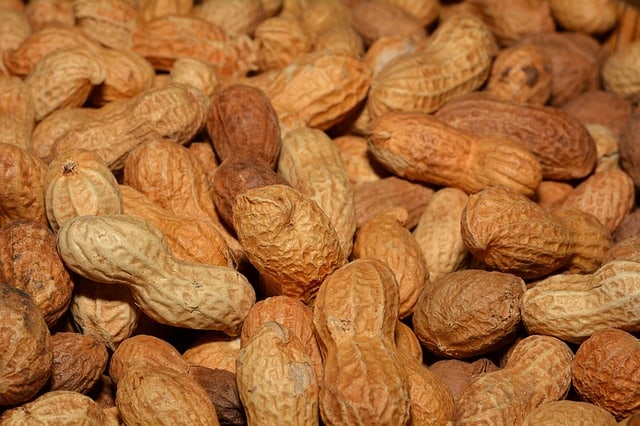
Before we get into answering this question, it is always important to emphasize the importance of speaking with your doctor before changing your diet. Though peanuts are a small addition or subtraction to a diet, your health is essential. It is vital to always take the advice prescribed by your doctor or health care provider.
Are peanuts good for those who struggle with diabetes? In this article, we will cover the answer to this exact question. We will also take a look at the nutritional value that peanuts have, and how you can add peanuts to your diet in a healthy way. The answer to the first question is full of good news, but of course, moderation is key.
The Nutrition in Peanuts
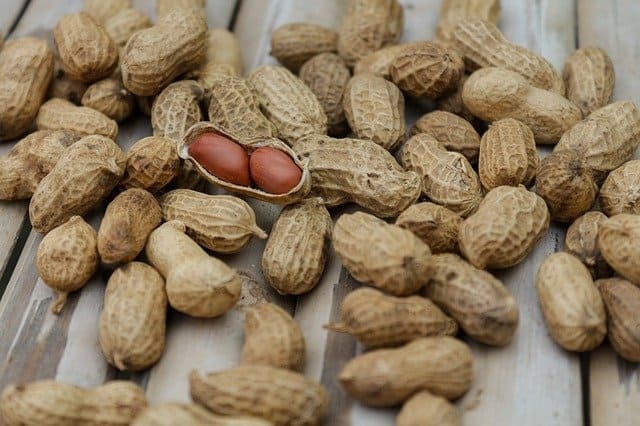
Peanuts are a legume, and like all legumes, they are packed with protein. Protein is already a great nutrient for people with diabetes, incredibly lean proteins, as they help the body with energy levels. These little protein-packed legumes also contain unsaturated fat, which can help the body control insulin levels.
What Are The Studies Saying?
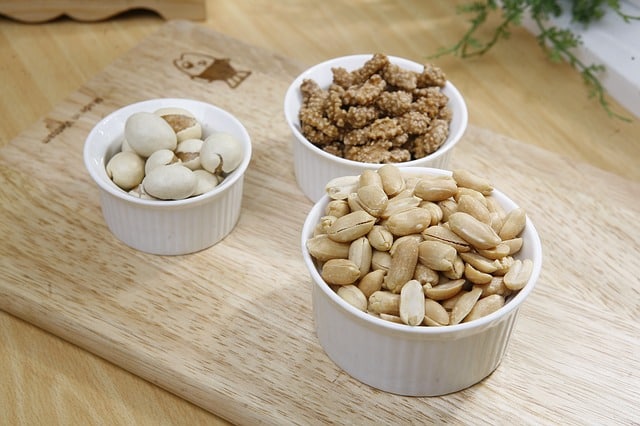
A recent study has even found that peanuts are a great nutritious snack to include in your diet. Because they are legumes, they are closer to beans than actual nuts, so they include all the same properties as beans and even peas.
The great thing about peanuts is that you can incorporate them into your diet in a variety of ways. Now that we know they are suitable for us and can even help with diabetes, and in some cases can help you regulate your blood sugar to prevent type 2 diabetes (a recent study found), let's look at the ways in which we can add peanuts to our diet without going overboard on the sweet stuff.
Yet another study has revealed that eating peanuts three times weekly can help lower the risk of developing diabetes by up to 40 percent. This is excellent news for people with diabetes who are looking for ways to manage their diabetes, and those who don't have diabetes but want to stay healthy.
With all that said, it is essential to know that even though peanuts are healthy, this is not grounds to eat all of the peanut butter cups in the world. It is important to talk to your doctor and read the ingredients on the packaging.
Like so many others, if you are in love with peanut butter and eating it out of the jar or dunking your apple slices in, then it is important to get a peanut butter that is organic and has no added sugar. Any additives would defeat the purpose and nutritional value that peanuts can offer for people with diabetes and those who are aiming to prevent it.
Ways To Eat Peanuts The Healthy Way
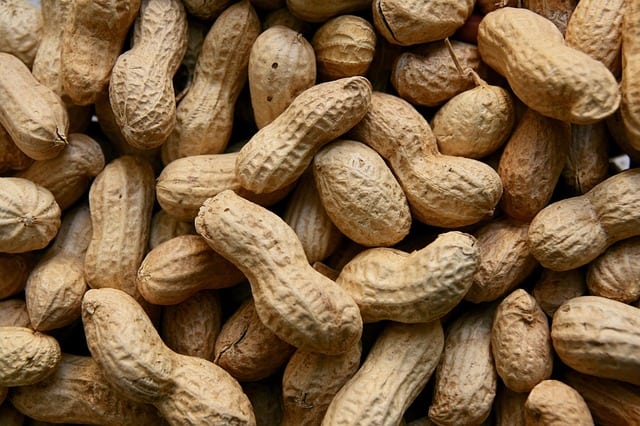
Finding dessert alternatives that still include peanuts is absolutely possible, so don’t give up your hopes just yet. In the next section, we will look at all the healthy ways to add peanuts to your diet.
Now that we have covered the nutritional value of peanuts, how can you incorporate peanuts into your diet in a healthy way? The good news is that there are so many healthy ways to incorporate peanuts into your diet. Here are just a few ideas and examples of what you can do to make your snack time and mealtime extra tasty.
Salads
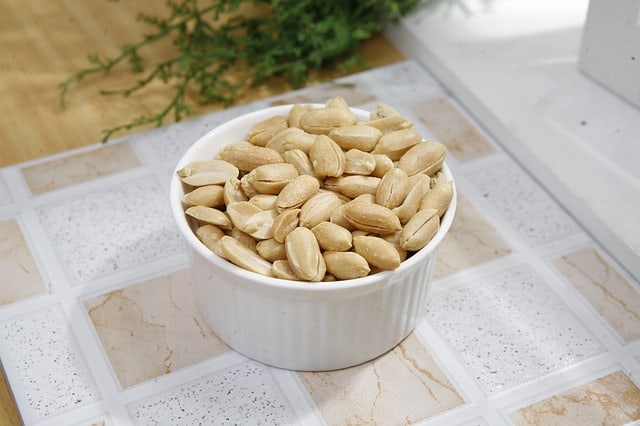
Crushing up roasted peanuts and using them as a salad topper is a must-try. They add a great texture to salads and really bring it all together as a filler, as most proteins in salads do. You can even put your peanuts in with your homemade dressing and blend it to make a great Asian-style dressing.
Oatmeal
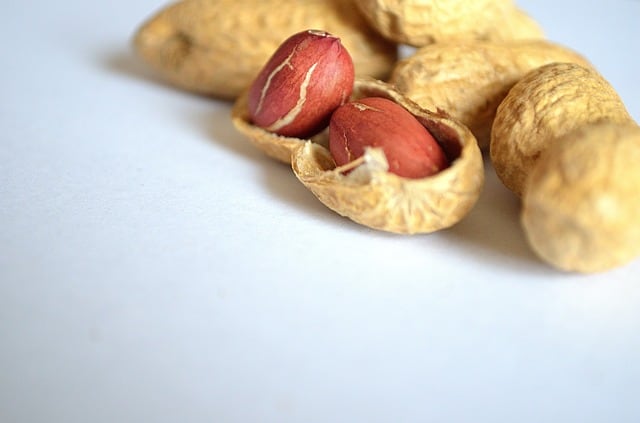
It is no question whether peanuts go well with oatmeal. You can either sprinkle crushed peanuts over the top of your oatmeal to give it a crunch, or you add a scoop (about a tablespoon) of organic peanut butter with no added sugars.
Smoothies and Smoothie Bowls
Adding a tablespoon of peanut butter to your smoothie or sprinkling crushed peanuts over a smoothie bowl is a great way to enhance flavor and texture while keeping things healthy.
Yogurt and Ice Cream
Crushed peanuts on top of ice cream are an absolute classic, and it is just as good when they are sprinkled on a fruit and yogurt bowl. You can even make your own frozen yogurt with peanut chunks in it by mixing crushed peanuts with your yogurt and simply popping it in the freezer, and enjoying it as a guilt-free dessert later!
Solo
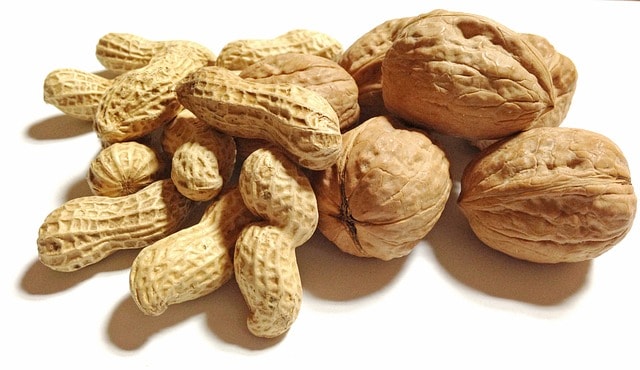
Of course, it is as simple as it sounds, but eating peanuts as a snack just on their own is the perfect way to add them to your diet. Everything is in moderation, so there’s no need to go to town on them, so just a handful is the perfect amount. It is important to note that too much sodium is not good, so if you decide to go the solo route, make sure you get peanuts low on the salts.
Is It Possible To Overeat Peanuts?
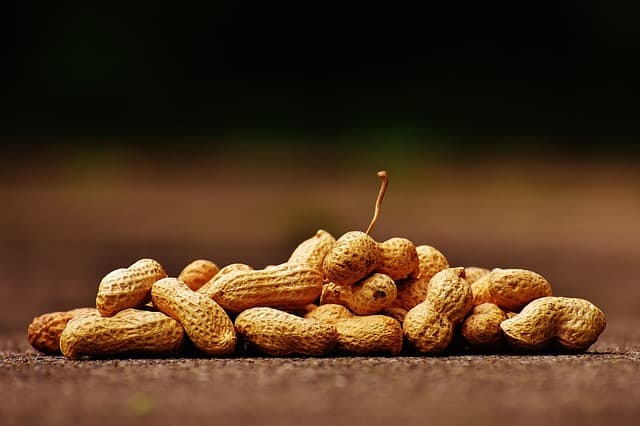
It is true that peanuts have gotten a bad reputation, and it has resulted in many people substituting peanuts for other nuts. The fact is, the bad reputation has come from overeating peanuts. We now know that peanuts are actually healthy and can help people with diabetes in the long run.
The bad reputation that peanuts have and being called unhealthy is because many people have resulted in overeating them. Roasted peanuts often have a lot of salt, which can raise sodium levels — this can raise blood pressure. Many peanut butter brands are also packed with added sugar, which can raise blood sugar.
We know that peanuts are packed with nutrients, and we have gone over how they can help with diabetes and even prevent it. Now we have to talk about whether it is possible to eat too much, and what happens if you do?
The answer here is yes, it is possible to eat too much when it comes to peanuts. The effect of overeating peanuts is raised cholesterol and sodium (if the peanuts are salted). Increased cholesterol means an increased risk of heart disease, and overall has the opposite effect of what you might be looking for.
If you are looking to add peanuts to your diet, always remember to add them in moderation. The recommended amount for peanuts is only about a handful a day. Any more than this can start to raise cholesterol and may prove to be ineffective.
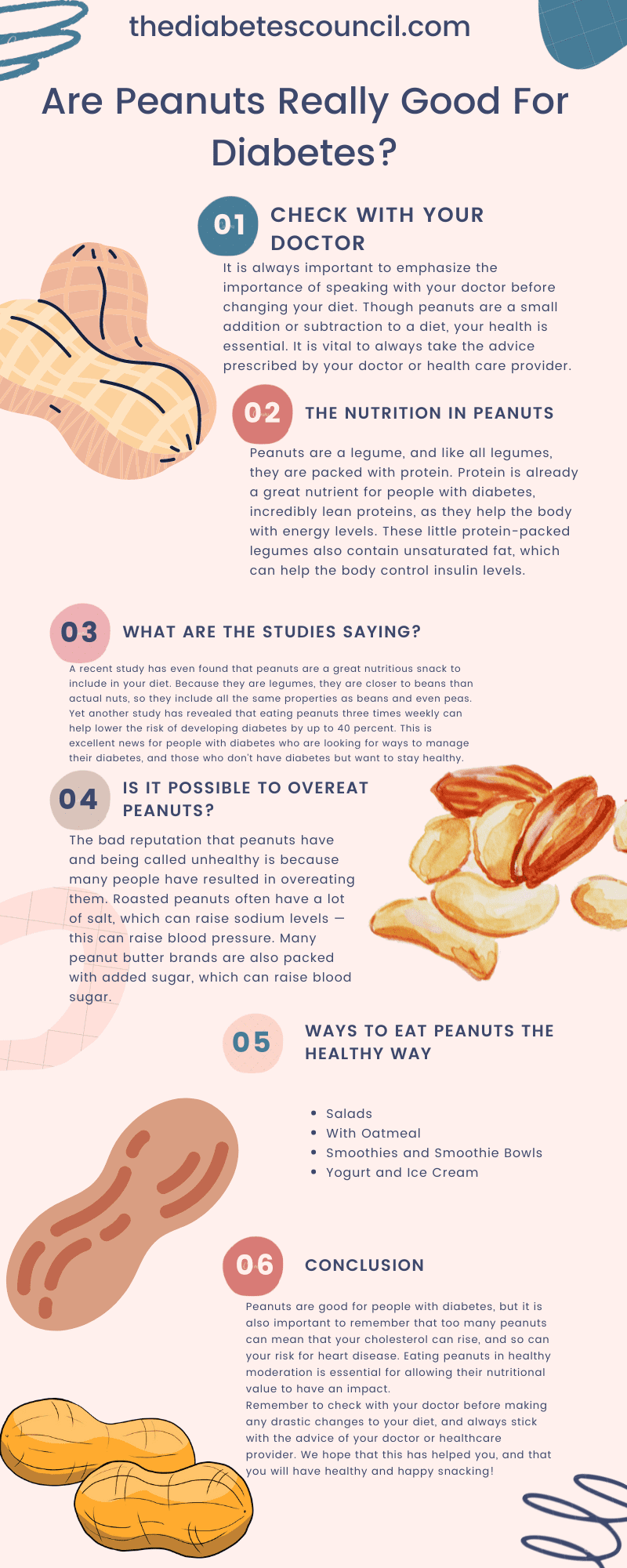
Conclusion
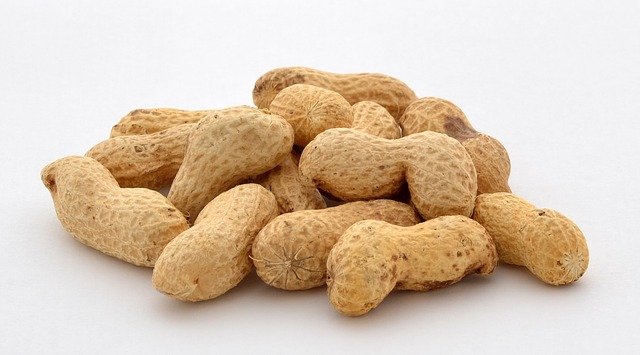
Peanuts are a tasty, inexpensive snack, as you might know, and they can easily be added to anyone's diet. In fact, peanuts are part of most people’s diets and are consumed by millions every year.
Recent studies have found that peanuts have the nutritional power to help with diabetes, and can even help prevent type 2 diabetes. We covered all the nutritional value that peanuts have, and what they can offer you if you incorporate them into your diet.
We talked about how peanuts like beans and peas are legumes and are actually packed with protein and fats that can help you regulate your blood sugar. We have also looked at the ways in which you can incorporate peanuts into your diet in a healthy way.
Peanuts are good for people with diabetes, but it is also important to remember that too many peanuts can mean that your cholesterol can rise, and so can your risk for heart disease. Eating peanuts in healthy moderation is essential for allowing their nutritional value to have an impact.
Remember to check with your doctor before making any drastic changes to your diet, and always stick with the advice of your doctor or healthcare provider. We hope that this has helped you, and that you will have healthy and happy snacking!


